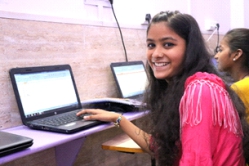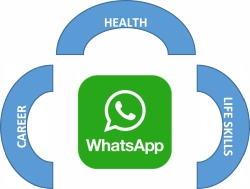Bridging the Digital Gender Divide
Gender
equality is not only a fundamental human right. It is also the keystone of a
prosperous, modern economy that provides sustainable inclusive growth. A
woman multiplies the impact of an investment made in her future by extending
benefits to the world around her, creating a better life for her family and
building a stronger community.

The foundation of more holistic approach of development starts from the local alleys of the country. Therefore, the effort to develop and empower must acknowledge the social realities of the local areas. One of the harsh realities of the local social fabric is the access to minimum or maximum resources based on one’s gender. Hence, it results in a huge gap between the education and employment of girls and boys. Employment and education is the sword, which needs to be sharpened in order to ensure women’s due in development.
Global approach is instrumental in bringing women at par and making them aware about the concepts and developments in different sectors in their own geographies. Digital technology has become an increasingly important tool for education, financial inclusion, entrepreneurship and civic participation. Many women are being left behind and not being able to make ample use of it due to the socio-cultural barriers. Therefore, in order to bring about some synergies, especially after the pandemic and operating in the ‘new normal’, Development Alternatives, in another initiative of ‘creating livelihood awareness among school students’ in Haridwar and Uttarakhand, has put efforts in making school girls more receptive to online modes of gaining knowledge through infotainment modes.
As the pandemic called for distant modes of learning to become the ‘new trend’, WhatsApp mobile application is being used as a platform to cater information needs of girl students of a government school in Haridwar while winning over issues of low bandwidth and limited connectivity to the internet. This is, hereby, serving a dual purpose of imparting skills for gaining sustainable livelihoods and getting girls used to digital modes of acquiring knowledge by reaching out to them in the interiors of Haridwar.
According to ‘Gender Equality and Development’,
an article published by World Bank, the access to resources is positively
linked to one’s input in the production inputs therefore, women have less
access to benefits of development programmes.

Development Alternatives has also worked on improving girl’s participation in getting skilled and employed. Under the ‘Bridge2Naukri’ initiative, online placement drives were organised to help job seekers to appear in interviews. Along with the placement support, the organisation ensured career counselling throughout. The counselling helped the girls to keep their focus on their careers when the lockdown forced them to focus more on household chores. The virtual job interviews helped the girls from the interiors to participate in the interviews and try seeking jobs during the lockdown period.
A digital transformation creates new avenues for the economic empowerment of women and can contribute to greater gender equality. Internet, digital platforms, mobile phones and digital financial services offer opportunities for all and can help bridge the divide by giving women the possibility to earn additional income, access knowledge and general information while increasing their employment opportunities. Hence, there is a need to seize this opportunity to foster greater gender equality in the labour market, boost economic growth and build a more inclusive, digital world. ■
References:
https://www.worldbank.org/en/research/dime/brief/dime-gender-program
https://www.oecd.org/els/soc/UPHILL_BATTLE_English.pdf.
Pooja Jha, Vishakha Mittal
pjha@devalt.org, vmittal@devalt.org